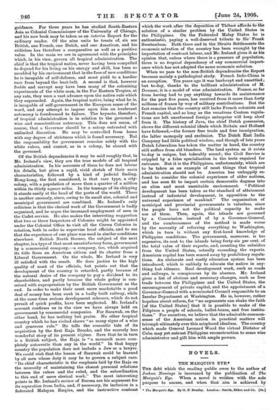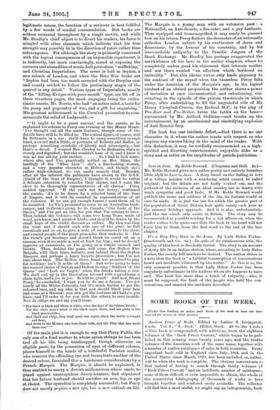THE MARQUIS'S EYE.*
TAE debt which the reading public owes to the author, of Joshua Netoings is increased by the publication of The Marquis's Eye. When a novel is written with the sole pitrpose to amuse, and when that aim is achieved by • The Marquis's Hr. By 4.8. Brsdby. London : Smith, Elder, and Co. [8e.1 , legitimate means, the function of a reviewer is best fulfilled by a few words of cordial commendation. But books are seldom animated throughout by a single motive, and while , Mr.. Bradby.'s chief object is to divert his readers, his fame is mingled with other elements which indicate that his true strength may possibly lie in the direction of satire rather than extravaganza. For although the story is primarily concerned with the logical consequences of an impossible experiment, it is indirectly, but more convincingly, aimed at exposing the excesses and absurdities of music-hall patriotism, " mafficking," and Christian Imperialism. The scene is laid in Septon, a new suburb of London, and when the Boer War broke out " Septon had been too much occupied with the Dreyfus case and county cricket to follow the preliminary stages of the quarrel in any detail." Various types of Imperialists, mostly of the " killing-Kruger-with-your-mouth" type, are hit off in
these vivacious pages, the most engaging being the enthu- ,
mastic curate, Mr. Norris, who had "an active mind, a taste for the pomp, and pageantry of war, and a gift for organising." His greatest achievement' is the Carnival procession to com- memorate the relief of Ladysmith :- " It ought to be a great success,' said the curate, as he explained his scheme to Percy one evening at the Manor House. I've thought out all the main features, though some of the, details have still to be filled in. The central figure, of course, will be Britannia in a car : she'll have to carry something in each hand, a sword and a Bible, or portraits of Roberts and Buller, or perhaps something symbolic of liberty and sovereignty,—but that's a detail. I wanted Mrs. Chorloy to be Britannia, she's so stately and dignified ; but she wouldn't hear of it, and I knew it was no use asking your mother So I had to look some- where else, and I've practically settled on Mrs. Sling, the landlady of the " Blue Lion" : she's a fine-looking woman, and a very popular character in Helton, and though she's rather high-coloured, we can easily remedy that. Besides, after all the interest the publicans have shown in the G.S.E. [Guild of the Sons of Empire], I thought it would be rather a delicate attention to consider their claims, and I want the show to be thoroughly representative of all classes.' Percy
• nodded approval. If the car's not too heavy,' continued
• the curate, it's to be drawn' by a selected team of the Sons of Empire, and it will be escorted .by representatives of all the Colonies. If we can get enough horses I want them all to be mounted. Le Vie's promised to come as an Australian bush- ranger, and Oofheim's going to do Canada, " Our Lady of the • Snows," and I've got an idea for you that I'm coming to later. Then, behind the Colonies, will come two Loug Toms, made of wood, you know, and painted khaki, and they'll be drawn by the small boys of the Guild, dressed as sailors. My idea was that the vicar and I should each ride one of the guns in full canonicals and so on, to give a note of seriousness to the show, and remind people of the great principles that underlie it. But the vicar's got lumbago and doesn't think he could sit on a cannon, even if we made a sort of back for him ; and he doesn't approve of canonicals, so I'm going in a simple cassock and biretta. Then, behind the guns, will come the Helton Fire Brigade, with their brass helmets, and behind them the Septon Rangers, and perhaps a fancy bicycle procession ; but I'm not sure about that. The Helton Brass Baud has promised to play for nothing : isn't it noble of them P And we're going to have the massed choirs of Septon and Helton to sing " Soldiers of the Queen" and "Lest we forget," when the band's taking a rest. We shall end up in the Recreation Ground with a gymkhana, a sham fight, and a feu de joie. It will be grand ! And now, friend Percy,' he concluded, I want you to do me a favour. I've got nearly all the White Colonists, but it's much harder to get the coloured ones, and my idea is that you should black your face and come as a Haussa : you can get the costume at Clarke's, you. kiiow, and I'll order it for you with the others, to save trouble. Now do oblige me and say you'll come.
"For black is black and white is white, since the days of the' Great Divide,' Yet the white man's drink is the black man's drink, and his pride is the black man's pride ;
And black and white, they shall meet one night, when the battle is fought and done,
And drink to the Mother who bore them both, and the Flag that has made them one." "
Of the main plot it is enough to say that Percy Pattie, the only son of a fond mother to whose apron-strings he has been tied all his life, being handicapped, though otherwise an eligible parti, by the possession of eyes of different colours, places himself in the hands of a wonderful Parisian oculist, who removes the offending eye and transplants another of the desired colour, furnished (for a handsome consideration) by a French Marquis. The Marquis, it should be explained, is thus enabled to marry a Jewish millionairess whose uncle, to guard against unscrupulous dowry-hunters, had stipulated that her future husband should sacrifice an arm, leg, or eye at choice: ' The operation is completely successful; but Percy does not merely acquire a new eye, but a new outlook on life, The Marquis is a young man with an extensive past : a. Nationalist, an Anti-Semite, a fire-eater, and a gay Lothario. Thus equipped and transmogrified, it may easily be guessed how on his return Percy flutters the dovecotes of an extremely orthodox London suburb by his exuberance of dress and demeanour, by the fervour of his courtship; and by his irreconcilable antipathy to the Semitic Jingoes of the Stock Exchange. Mr. Bradby has perhaps exaggerated the mawkishness of his hero in the earlier chapters, where he completely makes good his statement that between mother and son there existed " an affection which bordered on imbecility." But this idiotic virtue only lends piquancy to the contrast of the sequel when the blameless Percy falls under the dominion of the Marquis's eye. In the logical conduct of an absurd proposition the author shows a power of invention at once circumstantial and entertaining, cul- minating in the episode of the private- theatricals in which Percy, after undertaking to fill the ungrateful role of Sir Henry Campbell-Craven, the Radical M.P., in the play of Pro-Boer and Pro-Briton, turns the tables on the hero— represented by Mr. Aelfred Oofheim—and breaks up the entertainment by an unrehearsed and electrifying explosion of Anti-Semitic fury.
The book has oue intrinsic defect,—that there is no one
character in it whom the author treats with respect, or who inspires any sincere liking in the mind of the reader. With this deduction, it may be cordially recommended as. a high- spirited and diverting entertainment, enjoyable alike as a story and as satire on the ineptitudes of pseudo-patriotism.



















































 Previous page
Previous page